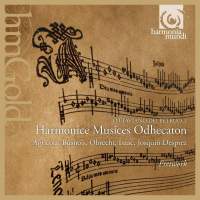Texte paru dans: / Appeared in: |
|
|
Outil de traduction (Très approximatif) |
|
|
Reviewer: Fabrice Fitch
A superbly programmed celebration of the birth of music printing, brilliantly played
A reviewer can pay few compliments more genuine than to returnn to a given recording again and again, for sheer pleasure. Having taken in 76 minutes of music at one sitting the first time around, that's just what I've been doing with Fretwork's latest offering, which sees them delve earlier than ever into the repertory of early instrumental music. The occasion is the anniversary of the establishment in Venice 500 years ago of the first music-printing presses (as I write the date is still 2001 - just). This is certainly the most stylish of several recordings made in connection with Ottaviano Petrucci's epoch-making achievement.
To present a recital of these song arrangements and 'purely ' instrumental pieces exclusively on viols is a novelty worth commenting on. Most other recordings of this repertory use a mixed consort (David Munrow's 'Art of the Netherland s' is one of the most famous examples); part of the charm of this disc is that it seduces you into the belief that the music was actually intended for viols. Ghiselin's Fors seulement setting sounds for all the world like an Elizabethan In nomine, and pieces like Agricola's Si dedero and its companion, Obrecht's Si sumpsero, sound as thou h they have 'chamber music' written all over them. (Incidentally, although the insert-notes are silent on the matter of instruments, the group plays on copies of late 16th-century instruments without sound posts, which significantly alters the sonority.) Fretwork's single-mindedness is further emphasised by their eschewal of a guest singer, an option that would have guaranteed more variety on the surface level, and allowed them perhaps a greater range of options. That they have not done so is admirable .
Another strength of the recital is programming. Sheer generosity aside (there are 32 tracks), it is a treat to have so many of my favourite pieces here. The 15th century's hit-parade is also reflected, with no fewer than four settings of De tous biens plaine, three of Fors seulement , and two each of Fortuna desperata, J'ay pris amous and Tandernaken. There are lesser-known pieces too, but always, it seems, the viols’ advocacy of the music (and of their suitability to it) is uppermost. Caron's Helas que pourrra devenir has cross rhythms and syncopations that bristle with an energy born of perfect ensemble.
Slight
reservations (the occasional odd choice of ficta, or the general
reluctance to ornament in a context that clearly lends itself to it) seem of
little moment. Lovers of polyphony of all sorts, in all its abstraction and all
its sensuousness, have something special in store . And lovers of chamber music
of later periods will find themselves on surprisingly similar territory. Enough
said: hats off. |
|
|
|
|
|
Cliquez l'un ou l'autre
bouton pour découvrir bien d'autres critiques de CD |
|




